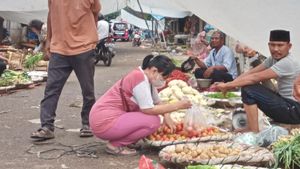JAKARTA - The number of cases of violence against women reportedly increased by 75 percent during the COVID-19 pandemic that hit Indonesia. Of course, this violence needs to be taken seriously.
This was conveyed by the Ambassador for the New Habit Adaptation of the Task Force for the Acceleration of Handling COVID-19, Doctor Reisa Broto Asmoro. According to him, since March violence against women has continued to show an increase.
"The Integrated Service Center for the Empowerment of Women and Children (P2TP2A) and Komnas Perempuan recorded an increase in cases of violence against women by 75% since the Covid-19 pandemic," said Doctor Reisa at the National Task Force Media Center, Graha National Disaster Management Agency (BNPB), Friday (10/7).
Gender-based violence can occur in private areas, such as within households, and in public areas, such as at work or in public places. Also, in normal situations or difficult situations, such as disasters and conflicts.
Reisa emphasized that victims should not be left alone to face violence and must still get help from other parties, even in this pandemic condition.
The dilemma of fulfilling the need for assistance to victims today requires the accuracy of officers or assistants regarding the situation and conditions of COVID-19 transmission when providing assistance.
Therefore, the Ministry of Women's Empowerment and Child Protection (Kemen PPPA) together with the United Nations Fund for Population (UNFPA) established a protocol for handling cases of gender-based violence that can be used as a joint protocol in handling violence.
This is intended so that victims and service providers can still provide case handling by referring to this protocol.
According to Reisa, there are several guidelines that victims of gender based violence can do to get help.
"First, victims can report to the local government, for example in Jakarta, a call center service is available to serve complaints of violence," he said.
Then, he also reminded that assistance services for victims of gender based violence were still opened by prioritizing health protocols.
"For example, by recording all documents and handling victims of violence by officers online," he said.
He continued, victims of violence can ask for help from trusted people who are able to provide support, both psychologically and medically, and as much as possible to help get out of situations that can cause the violence to recur.
Then for people who are not victims, they can help by speaking out and making sure to say no to violence in any form.
On this occasion, he appealed to continue to provide support to victims through gender-based anti-violence groups as a form of support for the government to cut the chain of violence.
"Come, care and protect them because, that means, protecting ourselves and the nation," he said.
The English, Chinese, Japanese, Arabic, and French versions are automatically generated by the AI. So there may still be inaccuracies in translating, please always see Indonesian as our main language. (system supported by DigitalSiber.id)













